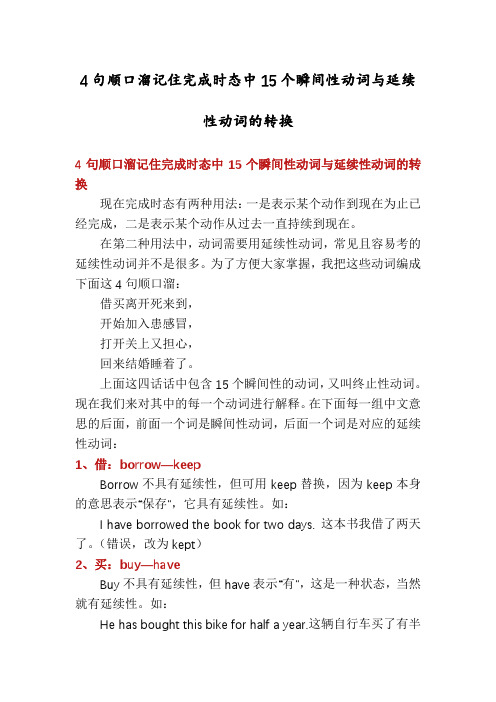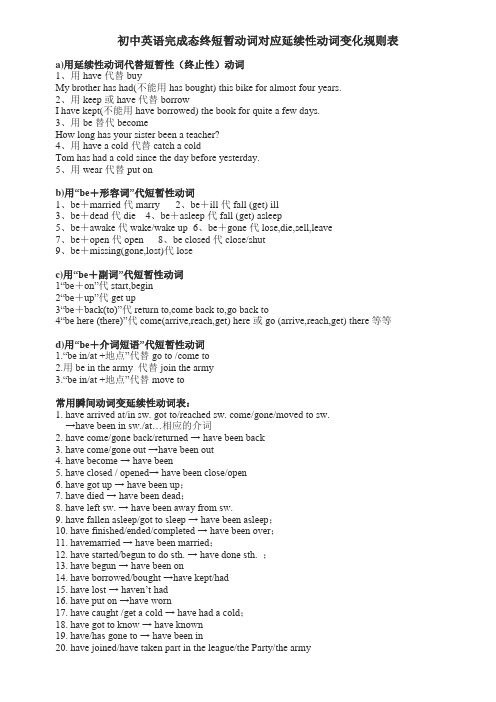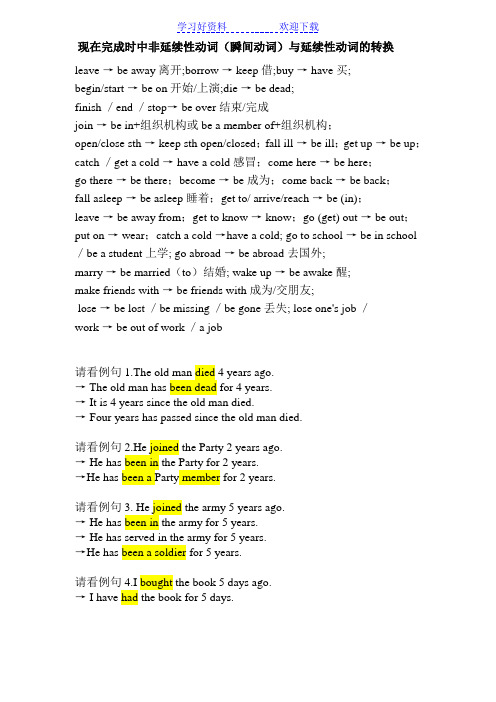完成时态瞬间动词变延续性动词规则表(参考模板)
4句顺口溜记住完成时态中15个瞬间性动词与延续性动词的转换

4句顺口溜记住完成时态中15个瞬间性动词与延续性动词的转换4句顺口溜记住完成时态中15个瞬间性动词与延续性动词的转换现在完成时态有两种用法:一是表示某个动作到现在为止已经完成,二是表示某个动作从过去一直持续到现在。
在第二种用法中,动词需要用延续性动词,常见且容易考的延续性动词并不是很多。
为了方便大家掌握,我把这些动词编成下面这4句顺口溜:借买离开死来到,开始加入患感冒,打开关上又担心,回来结婚睡着了。
上面这四话话中包含15个瞬间性的动词,又叫终止性动词。
现在我们来对其中的每一个动词进行解释。
在下面每一组中文意思的后面,前面一个词是瞬间性动词,后面一个词是对应的延续性动词:1、借:borrow—keepBorrow不具有延续性,但可用keep替换,因为keep本身的意思表示“保存”,它具有延续性。
如:I have borrowed the book for two days. 这本书我借了两天了。
(错误,改为kept)2、买:buy—haveBuy不具有延续性,但have表示“有”,这是一种状态,当然就有延续性。
如:He has bought this bike for half a year.这辆自行车买了有半年了。
(错误,改为had)3、离开:leave—be awayLeave不具有延续性,但be是表状态的词,所有表状态的词都具有延续性。
如:He has left here since last year. 他自从去年就离开这儿了。
(错误,改为been away)4、死:die—be deadDie是瞬间性动词,马上发生也马上结束了,“死”这个动作不可能持续好长一段时间,但be dead表示“是死的”,自然就能持续了。
如:His grandpa has died for two years. 他爷爷去逝两年了。
(错误,改为been dead)5、来:come (to)—be (in/at)表示来到城市、国家等大地方,就用be in,如果是来到一个小地方,介词就用at。
现在完成时中短暂性动词变延续性动词归纳表精编版

延续性动词与非延续性动词及其转换动词按其动作发生的方式、发生过程的长短可分为延续性动词与非延续性动词。
一.延续性动词表示能够延续的动作,如:learn, work, stand, lie, know, walk, keep, have, wait, watch, sing, read, sleep, live, stay等。
延续性动词可以与表示时间段的状语连用。
表示时间段的短语有: ⑴for+一段时间, 如:for 2 years; ⑵since从句, 如since he came here; since+过去时间点名词, 如since last year, since 5 days ago。
例: He has lived here for 6 years.You can keep the book f or 5 days.二.非延续性动词也称终止性动词、瞬间动词, 表示不能延续的动作,这种动作发生后立即结束。
如:open, die, close, begin, finish, come, go, move, borrow, lend, buy等。
非延续性动词在肯定句中与表示时间点的状语连用,如:two years ago; at 5o'clock;例:He died 5 yearsago.三.延续性动词与非延续性动词之间的转换:(考试重点)例:He left five minutes a go. = He has been awayfor five minutes.这句话的意思是指他离开的动作是5分钟之前发生的,是过去时。
也就是说从他离开到现在已经有五分钟了,这个动作是延续的,要用现在完成时,并且要把原来的短暂性动词改为延续性动词。
一些短暂性动词及相应的延续性动词:arrive(get to /reach)→ be here (in)begin(start) → be ondie → be deadcome here(back)→be here(back)leave → be away (from)fall ill(sick, asleep)→be ill(sick, asleep)get up→ be upgo/ get out(there)→ be out(there)finish → be overput on → wear 或be onopen → be open(keep sth. open)join → be in或be a member of…+组织机构close →be closedgo to school → be a studentborrow →keepbuy/get →havecatch(a cold) → have(a cold)know get to know →begin to study → study come to work → work move to → live in finish → be overcome to → be insit down → be seated marry → be married dress → be dressed become → be。
初中英语完成态终短暂动词对应延续性动词变化规则表

初中英语完成态终短暂动词对应延续性动词变化规则表a)用延续性动词代替短暂性(终止性)动词1、用have代替buyMy brother has had(不能用has bought) this bike for almost four years.2、用keep或have代替borrowI have kept(不能用have borrowed) the book for quite a few days.3、用be替代becomeHow long has your sister been a teacher?4、用have a cold代替catch a coldTom has had a cold since the day before yesterday.5、用wear代替put onb)用“be+形容词”代短暂性动词1、be+married代marry2、be+ill代fall (get) ill3、be+dead代die4、be+asleep代fall (get) asleep5、be+awake代wake/wake up6、be+gone代lose,die,sell,leave7、be+open代open 8、be closed代close/shut9、be+missing(gone,lost)代losec)用“be+副词”代短暂性动词1“be+on”代start,begin2“be+up”代get up3“be+back(to)”代return to,come back to,go back to4“be here (there)”代come(arrive,reach,get) here或go (arrive,reach,get) there等等d)用“be+介词短语”代短暂性动词1.“be in/at +地点”代替go to /come to2.用be in the army 代替join the army3.“be in/at +地点”代替move to常用瞬间动词变延续性动词表:1. have arrived at/in sw. got to/reached sw. come/gone/moved to sw.→have been in sw./at…相应的介词2. have come/gone back/re turned → have been back3. have come/gone out →have been out4. have become → have been5. have closed / opened→ have been close/open6. have got up → have been up;7. have died → have been dead;8. have left sw. → have been away from sw.9. have fallen a sleep/got to sleep → have been asleep;10. have finished/ended/completed → have been over;11. havemarried → have been married;12. have started/begun to do sth. → have done sth. ;13. have begun → have been on14. have borrowed/bought →have kept/had15. h ave lost → haven’t had16. have put on →have worn17. have caught /get a cold → have had a cold;18. have got to know → have known19. have/has gone to → have been in20. have joined/have taken part in the league/the Party/the army例: *** The old man died 4 years ago. ----The old man has been dead for 4 years.---It is 4 years since the old man died. ---Four years has passed since the old man died.*** He joined the Party 2 years ago. -----He has been in the Party for 2 years.*** I bought the book 5 days ago. ---- I have had the book for 5 days.补充练习:1. When he arrived at the bus stop, the bus ________ for 20 minutes.A. has leftB. had leftC. has been awayD. had been away2. I ______ the League for 5 years so far.A. joinedB. have joinedC. have been in3. The factory ________ since the February of 1988.A . has been open B. has opened C. was open D. opened4. Mary and Rose _______friends since they met in 2000.A. have madeB. have beenC. madeD. have become5.You mustnt ________ until he comes back.A. be awayB. leaveC. be left6.The meeting _______ for a week now.A. has finishedB. has endedC. has been over7.Miss Gao ______ this school for nearly 5 years.A. has been inB. has come toC. has taught8.Ben ______ a teacher for 4 years .A. has beenB. has becomeC. wasD. became9. I ______ home for a week.A. have returnedB. have been backC. returned10. How long _______ he ________ ?A. diedB. has, diedC. has, been dead11. He ______ at eight yesterday afternoon.A. sleptB. was sleepingC. has sleepD. had slept12.He ________ the car for a week.A. boughtB. has boughtC. has had13.-----How long _____ you _____ ill ? -----Two weeks.A. did fallB. have, fellC. have, been14.Since 2000, he _____ his hometown.A. has leftB. has moved awayC. has been away from15.Ill lend you the book , but you can only _____ it for 2 days.A. borrowB. keepC. take16.The bus ______ on the road for 2 hours so far.A. has stoppedB. stoppedC. has been17.Are you _____ the jacket these days?A. wearingB. putting onC. dressingD. on18.He ________ foe 2 hours.A. got upB. has got upC. has been up19. Tom is ill in hospital. He _______ a cold for several days.A. isB. catchesC. has caughtD. has had20.----- How long can I ______ the book? ------ Two weeks.A. borrowB. lendC. getD. keepKey: 1---5 D C A B B; 6---10 C A A B C; 11---15 B C C C。
完成时态瞬间动词变延续性动词规则表精编版

完成时态瞬间动词变延续性动词规则表延续性动词与终止性动词:动词按其动作发生的方式,动作发生过程的长短,分为延续性动词和终止性动词。
延续性动词表示的动词是一种延续的动作,这种动词可以延续下去或产生持久的影响。
如:learn,work,stand,lie,know,walk,keep,have,wait,watch,sing,read,sleep,live终止性动词也称非延续性动词、瞬间动词,表示的动作不能延续,即动作发生立即结束,产生某种结果。
在有了某种结果之后,就不能再继续下去。
如:leave,start,set out,arrive,reach,get to,begin,stop,shut,turn off,marry,put,put on,get up,wake,fall,join,receive,finish,end,complete,become,come,go,die,close,open,break,give,jump,buy,borrow等。
1.终止性动词的用法1)终止性动词可用来表示某一动作的完成,因此可用于现在完成时。
如:The plane has arrived飞机到了。
I have finished my homework.我已完成了作业。
2)终止性动词表示的动作极其短暂,不能持续,所以其现在完成时(只限于肯定式)不能和表示一段时间的状语连用。
如:①他死了三年了。
误:He has died for three years.②他来这儿三个月了。
误:he has come here for three months.①②两句中的动词die和come都为终止性动词,它们可用于完成时,但不能同表示一段时间的状语for three years /months连用。
那这两句如何译成英语呢?我们可采用下列方法:A.用能够表示持续状态的相应的延续性动词替换句中的终止性动词。
如:①He has been dead for three years.②He has been here for three months.将短暂性动词改为相应的延续性动词或短语和一段时间连用,其常用的方法有如下几种:a.用相应的延续性动词替换的主要有:buy→have,borrow→keep,come /go /become→be,catch /get a cold→have a cold,get to know→know等。
现在完成时之瞬间动词转变为持续性动词

现在完成时之瞬间动词转变为持续性动词一、兴趣导入:Teacher: Tom, why are you late for school every day?Tom: Every time I come to the corner, a sign says, "School-Go Slow".二、知识点回顾:现在完成时基本用法三、(1)专题讲解:在完成时中,一个瞬间性动词(一次性动作)不能与表示一段时间的状语(for, since, how long等)连用,此时须将该瞬间动词改为延续性动词或状态动词.Eg:buy ( bought ) --- have / has had 买borrow (borrowed) --- have / has kept 借die ( died ) --- have / has been dead 死leave ( left ) --- have / has been away ( from ) 离开begin ( began ) --- have / has been on 开始join ( joined) --- have / has been in 参加--- have / has been a ( party) membergo (went) --- have / has been there / in 去come/arrive/reach/get to --- have / has been here / in 来/到达end (ended) ----- have/has been over 结束eg. The film began five minutes ago.------The film has been on for five minutes.------It has been five minutes since the film began.用“be+形容词”代终止性动词1、be+married代marry2、be+ill代fall (get) ill3、be+dead代die4、be+asleep代fall (get) asleep5、be+awake代wake/wake up6、be+gone代lose,die,sell,leave7、be+open代open8、be closed代close/shut用“be+副词”代终止性动词1“b e+on”代start,begin2“be+up”代get up3“be+back(to)”代return to,come back to,go back to4“be here (there)”代come(arrive,reach,get) here或go (arrive,reach,get) there等等用“be+介词短语”代终止性动词1.“be in/at +地点”代替go to /come to2.用be in the army 代替join the army3.“be in/at +地点”代替move to四、巩固练习:将瞬间动词变成延续性动词表:1. have arrived at/in....... got to/reached...... come/gone/moved to...... →2. have come/gone back/returned →3. have come/g one out →4. have become →5. have closed / opened→6. have fallen ill→7. have died →8. have left...... →9. have fallen asleep/got to sleep →10. have finished/ended/completed →11. have married →12. have begun →13. have borrowed/bought →14. have/has gone to →15. have joined/have taken part in the league/the Party/the army→五、拓展训练:1.你曾经吃过鱼和薯条吗?2. 我刚刚丢了我的化学书。
现在完成时中瞬间动词变延续性动词总结

现在完成式中瞬间性动词如何变为延续性动词。
在完成式中,一个瞬间性动词(一次性动作如buy,borrow,die,leave,begin,join等)不能与表示一段时间的状语(for, since, how long等)连用,此时须将该瞬间动词改为延续性动词或状态动词.如:He borrowed a book two days ago.(用现在完成式表达)He has kept the book for two days.他持有这本书两年了。
1、他三年前买了一辆车。
___________________________________2、他两年前参了军。
___________________________________答案:1、He has had a car for three years.或He has bought a car. 或He bought a car three years ago.2、He has been in the army for two years.或He has joined the army.He joined the army two years ago.切记:有些动词是非延续的,在此用法中要换成其相对应的延续性动词:His father has died.His father has been dead for three years.他父亲已经去世三年了。
She has joined the Party/League.She has been in the Party/ League for two months.=She has been a Party/ League member for two months.他已经入党/团两个月了。
The film has started/begun.The film has been on/ lasted since 5 minutes ago.电影已经开始5分钟了。
现在完成时中瞬间动词变延续性动词总结

现在完成时中瞬间动词变延续性动词总结在现代汉语中,现在完成时是表示过去发生的动作对现在产生的影响的一种时态。
而在现在完成时中,瞬间动词和延续性动词的用法有所不同。
本文将从理论和实践两个方面,对现在完成时中瞬间动词变延续性动词进行总结。
一、现在完成时的构成现在完成时由“助动词have/has + 过去分词”构成。
例如:I have seen that movie.(我已经看过那部电影了。
)二、瞬间动词变延续性动词1. 瞬间动词变成延续性动词的方法在现在完成时中,瞬间动词变为延续性动词的方法主要是通过加上“-ing”后缀。
例如:come -> coming;go -> going;see -> seeing等。
这种变化使得原本表示瞬间动作的动词变成了表示持续性动作的动词。
2. 延续性动词的使用场合延续性动词表示的动作在时间上没有明确的结束点,通常是持续性的。
在现在完成时中,延续性动词的使用场合主要包括以下几种:(1)表示一个长时间内一直在进行的动作。
例如:I have been studying English for 5 years.(我已经学习英语5年了。
)(2)表示一个习惯性的动作或者状态。
例如:She has been playing the piano since she was a child.(她从小就一直在弹钢琴。
)(3)表示一个与现在有关联的动作或状态。
例如:He has been living in this city for 3 years.(他已经在这个城市生活了3年了。
)三、结论现在完成时中瞬间动词变延续性动词是一种常见的语法现象。
通过掌握这种现象,我们可以更好地理解和使用现在完成时这一时态。
这也有助于我们提高自己的语言表达能力,使我们的语言更加地规范和准确。
现在完成时中非延续性动词(瞬间动词)与延续性动词的转换

现在完成时中非延续性动词(瞬间动词)与延续性动词的转换leave → be away离开;borrow → keep借;buy → have买;begin/start → be on开始/上演;die → be dead;finish /end /stop→ be over结束/完成join → be in+组织机构或be a member of+组织机构;open/close sth → keep sth open/closed;fall ill → be ill;get up → be up;catch /get a cold → have a cold感冒;come here → be here;go there → be there;become → be成为;come back → be back;fall asleep → be asleep睡着;get to/ arrive/reach → be (in);leave → be away from;get to know → know;go (get) out → be out;put on → wear;catch a cold →have a cold; go to school → be in school /be a student上学; go abroad → be abroad去国外;marry → be married(to)结婚; wake up → be awake 醒;make friends with → be friends with成为/交朋友;lose → be lost /be missing /be gone 丢失; lose one's job /work → be out of work /a job请看例句1.The old man died 4 years ago.→ The old man has been dead for 4 years.→ It is 4 years since the old man died.→ Four years has passed since the old man died.请看例句2.He joined the Party 2 years ago.→ He has been in the Party for 2 years.→He has been a Party member for 2 years.请看例句3. He joined the army 5 years ago.→ He has been in the army for 5 years.→ He has served in the army for 5 years.→He has been a soldier for 5 years.请看例句4.I bought the book 5 days ago.→ I have had the book for 5 days.。
- 1、下载文档前请自行甄别文档内容的完整性,平台不提供额外的编辑、内容补充、找答案等附加服务。
- 2、"仅部分预览"的文档,不可在线预览部分如存在完整性等问题,可反馈申请退款(可完整预览的文档不适用该条件!)。
- 3、如文档侵犯您的权益,请联系客服反馈,我们会尽快为您处理(人工客服工作时间:9:00-18:30)。
完成时态瞬间动词变延续性动词规则表延续性动词与终止性动词:动词按其动作发生的方式,动作发生过程的长短,分为延续性动词和终止性动词。
延续性动词表示的动词是一种延续的动作,这种动词可以延续下去或产生持久的影响。
如:learn,work,stand,lie,know,walk,keep,have,wait,watch,sing,read,sleep,live终止性动词也称非延续性动词、瞬间动词,表示的动作不能延续,即动作发生立即结束,产生某种结果。
在有了某种结果之后,就不能再继续下去。
如:leave,start,set out,arrive,reach,get to,begin,stop,shut,turn off,marry,put,put on,get up,wake,fall,join,receive,finish,end,complete,become,come,go,die,close,open,break,give,jump,buy,borrow等。
1.终止性动词的用法1)终止性动词可用来表示某一动作的完成,因此可用于现在完成时。
如:The plane has arrived飞机到了。
I have finished my homework.我已完成了作业。
2)终止性动词表示的动作极其短暂,不能持续,所以其现在完成时(只限于肯定式)不能和表示一段时间的状语连用。
如:①他死了三年了。
误:He has died for three years.②他来这儿三个月了。
误:he has come here for three months.①②两句中的动词die和come都为终止性动词,它们可用于完成时,但不能同表示一段时间的状语for three years /months连用。
那这两句如何译成英语呢?我们可采用下列方法:A.用能够表示持续状态的相应的延续性动词替换句中的终止性动词。
如:①He has been dead for three years.②He has been here for three months.将短暂性动词改为相应的延续性动词或短语和一段时间连用,其常用的方法有如下几种:a.用相应的延续性动词替换的主要有:buy→have,borrow→keep,come /go /become→be,catch /get a cold→have a cold,get to know→know等。
b.be+名词:join the Party /League→be a Party /League member,go to school→be a student,join the army→be a soldier等。
c.be+形容词/副词:die→be dead,leave→be away(from),put on→be on,finish /end→be over,begin /start→be on,come→be here /in,fall asleep→be asleep,go out→be out等。
d.be+介词短语:go to school→be in /at school,join the army→be in the army等。
e.去掉短语中的短暂性动词:get to know→know,come to work→work,begin to study→study等。
B.把误句中表示一段时间的状语改为表示过去时间的状语,原动词的完成时改为过去时。
如:①He died three years ago.②He came here three months ago.C.用“It is /has been +一段时间+since(一般过去时)”结构。
如:①It is /has been three years since he died.②It is /has been three months since he came here.D.用“多长时间+has passed +since(一般过去时)”结构。
如:①Three years has passed since he died.②Three months has passed since he came here.3)终止性动词现在完成时的否定式,已成为一种可以延续的状态,因此可以和表示一段时间的状语连用。
如:I haven't heard from him for two weeks.我已两个星期没收到他的信了.4)终止性动词的否定式同until一起连用,构成“not...until”结构,意为“直到……才……”,表示这个动作直到until所表达的时间到来时才发生。
如:We won't go to visit the Great Wall until the rain stops.直到雨停了我们才会去参观长城。
—When did you go to bed last night?昨晚你几点钟点上床睡觉的?—I didn't go to bed until my father got home.直到我爸爸到家我才上床睡觉。
5)在while(表示“一段时间”)引导的从句中,不能用终止性动词,但when可以,因为when可表示“时间的点”,也可表示“一段时间”。
如:误:While I got to the village,it was dark.正:When I got to the village,it was dark.6)终止性动词肯定式的完成时不能和how long连用。
如:误:How long have you borrow the book?可改用延续性动词或与when连用的一般过去时。
正:How long have you kept the book?正:When did you borrow the book?2.延续性动词的用法1)延续性动词可以用于现在完成时,其完成时可以同一段时间状语连用。
如:I have waited for him for nearly two hours.我等他快两个小时了。
2)终止性动词不能和表一段时间的状语连用。
同样,延续性动词也不能和表示短暂时间的时间点连用。
如:误:It rained at eight yesterday morning.rain为延续性动词,而at eight是表示时间点的状语,显然矛盾。
如果要用延续性动词表示一瞬间的行为,可以借助come,get,begin 等终止性动词来表达。
上句可改为:It began to rain at eight yesterday morning.3)在until引导的时间状语从句中,若主句的谓语动词是持续性动词,既可以用肯定形式,也可以用否定形式,但句子含义不同。
试比较:She listened to the radio until her father came back.她一直听收音机到她父亲回来。
She didn't listen to the radio until her father came back.直到她父亲回来才听收音机。
【强化训练】(1)My brother ____ the Youth League for two years.A.has been in B.has entered C.has taken part in D.has joined in ⑵—____have you been away from home?—(I have been away from home)For five years.A.How much B.What time C.How long D.When(3)The meeting ____ for five hours.A.has finished B.has ended C.has been over D.has stopped (4)When Jack arrived,he and Mary______ for almost an hour.A.had gone B.had set off C.had left D.had been away(5)The baby ____ for eleven hours.A.fell asleep B.has fallen asleep C.has got to sleep D.has been asleep(6)While I ____ Beijing,it was raining very hard.A.got to B.reached C.arrived in D.visited(7)—How long have you ____ ?—Since two years ago.A.fallen ill B.been ill C.left home D.married(8)—What was the party like?—Wonderful.It's years ____ I enjoyed myself so much.A.after B.when C.before D.since(9)—It is weeks since he ____ .—So it is.We'd better ask someone else to help us.A.fell ill B.was ill C.is ill D.has been ill(10)I'll lend you my book,but you can only__it for three days.A.borrow B.keep C.take D.got。
